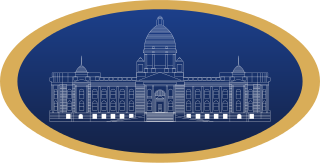 |
|---|
Parliamentary elections were held in the People's Republic of Serbia on 18 March 1951 to elect the 315 members of the National Assembly. [1]
 |
|---|
Parliamentary elections were held in the People's Republic of Serbia on 18 March 1951 to elect the 315 members of the National Assembly. [1]
A new electoral law, the Act on the Election of Deputies, was passed on 13 May 1950. [2] The number of deputies in the Assembly was increased from 287 to 315. [2]
Of the 4,396,816 registered voters, 3,854,042 (88%) voted. [1]

The National Assembly is the unicameral legislature of Serbia. The assembly is composed of 250 deputies who are proportionally elected to four-year terms by secret ballot. The assembly elects a president (speaker) who presides over the sessions.

The Parliament of Serbia and Montenegro was the legislative body of Serbia and Montenegro. The parliament was unicameral and was made up of 126 deputies, of which 91 were from Serbia and 35 were from Montenegro. The parliament was established in 1992 as the Federal Assembly of Yugoslavia as a direct replacement for Parliament of Yugoslavia and was renamed in 2003. With the declaration of independence of Montenegro on June 3, 2006, the parliament was dissolved.

The Serbian Renewal Movement is a liberal and monarchist political party in Serbia. Since its formation in 1990, it has been led by writer Vuk Drašković.
The People's Peasant Party is an agrarian political party in Serbia.

The Liberal Democratic Party is a liberal political party in Serbia. It is led by Čedomir Jovanović.

The Politics of Serbia are defined by a unitary parliamentary framework that is defined by the Constitution of Serbia in which the president, currently Aleksandar Vučić, is the head of state while the prime minister, currently Ana Brnabić, is the head of government. Executive power is exercised by the Serbian government and the President of Serbia. Legislative power is vested in the unicameral National Assembly which is composed of 250 proportionally elected deputies. The judiciary is independent and is headed by the Supreme Court of Cassation, which is also the highest court in Serbia.

The Party of United Pensioners, Farmers, and Proletarians of Serbia – Solidarity and Justice is a political party in Serbia that advocates for pensioners' interests.
The Albanian Coalition of Preševo Valley is a coalition of groups representing the Albanian inhabitants of the Preševo Valley in South Serbia.
The Social Democratic Party of Serbia is a centre-left political party in Serbia. Orientated towards the principles of social democracy, it has been led by Rasim Ljajić since its formation in 2009.

The president of the National Assembly of Serbia is the presiding officer of the National Assembly of Serbia. The president is elected by members of each new assembly for a term lasting four years.
The Social Democratic Party is a centre-left political party in Serbia.

New Party–Experts Should Have A Say is a liberal political party in Serbia. It was founded in 2013 as the New Party by Zoran Živković, the former Prime Minister of Serbia and former member of the Democratic Party. Following the merger in 2022, Vladimir Kovačević became the party president.

Enough is Enough is a right-wing populist political party in Serbia.
The Green Party was a political party in Serbia, based in Novi Sad. The party also represented the Slovak minority in Serbia.

Milija Miletić is a politician in Serbia. He was president of the municipality of Svrljig for most of the period from 2008 to 2014 and has served in the National Assembly of Serbia since 2014. Miletić is the leader of the United Peasant Party.
The United Peasant Party is an agrarian political party in Serbia. Its primary area of strength is in the municipality of Svrljig. It is affiliated with the European People's Party in the Congress of Local and Regional Authorities.
The Serbian People's Party is a right-wing populist and national-conservative political party in Serbia. It was formed in 2014 by former members of the Democratic Party of Serbia and is currently led by Nenad Popović.
Vjerica Radeta is a Serbian politician. She is a prominent figure in the far-right Serbian Radical Party and has served several terms in the National Assembly of Serbia.

The Russian Party is a political party in Serbia representing the Russian minority. In addition to the small Russian minority, the party also gathers a large number of pro-Russian citizens, mostly Serbs. The party's president is Slobodan Nikolić, a former vice-president of the People's Peasant Party. The party competed in the 2023 parliamentary election in alliance with the New Communist Party of Yugoslavia.
Local elections were held in Serbia on 19 September and 3 October 2004, concurrently with the 2004 Vojvodina provincial election. This was the only local election cycle held while Serbia was a member of the State Union of Serbia and Montenegro.